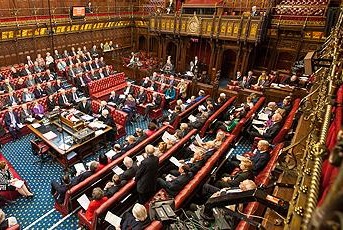Secondary Legislation Scrutiny Committee examines March's HC 590 due to lack of sufficient information on changes
The cross-party House of Lords Secondary Legislation Scrutiny Committee last week published a report that considers the major statement of changes to the Immigration Rules released by the Home Office on 14 March (HC 590).
 Image credit: UK GovernmentYou can read the Committee's 12-page report here or download it here.
Image credit: UK GovernmentYou can read the Committee's 12-page report here or download it here.
March's statement of changes increased the minimum income requirement (MIR) for family/partner/spouse visas from £18,600 to £29,000 and increased the minimum earnings threshold for those arriving on the Skilled Worker visa route to £38,700.
The statement was drawn to the special attention of the House of Lords on the ground that the accompanying explanatory material failed to provide sufficient information about the objective and intended implementation of the changes.
In its report, the Secondary Legislation Scrutiny Committee is highly critical of the Home Office's "clear-cut failure" to publish an impact assessment (IA) and an equalities impact assessment (EIA) for March's statement and for February's earlier statement of changes (HC 556), calling it "unacceptable".
"[T]he Home Office has failed to publish these documents and has not responded to some of our questions on matters that should be contained in them. This is unacceptable: we cannot do our job of giving advice to the House, and the House cannot do its job of scrutinising the legislation, if Government does not provide adequate information," the Committee stated.
It continued: "We have criticised the Home Office's explanatory material with such frequency that we are concerned there may be a systemic or cultural issue that is preventing the Home Office from getting it right."
Lord Thomas of Cwmgiedd, a member of the Committee, added yesterday that the failure to provide the assessments casts doubt on whether the Home Office fully understands the effects of its own rule changes.
There is also criticism from the Secondary Legislation Scrutiny Committee about the lack of wider consultation on the impact of the changes.
The Committee said: "We do not believe that the Home Office can fully understand the effects of its policies if it does not consult those who will be impacted. Indeed, the [explanatory memorandum] itself notes that 'any significant impacts on business are likely to be indirect as a result of business decisions on how to respond to these changes' but does not seek to find out or report what those business decisions might be. In this case the Home Office has not even sought advice from the [Migration Advisory Committee], as it did when introducing the MIR. This lack of consultation compounds our concerns about the use and quality of impact information."
In addition, the Secondary Legislation Scrutiny Committee's report finds it is not clear what the policy to increase the MIR from £18,600 to £29,000 (and to £38,700 by early 2025) is designed to achieve.
It noted: "The Home Office has mentioned at least five aims: restoring a value that has not been increased for many years; ensuring that families are self-sufficient; supporting an ambition to transform the UK economy; making a positive impact on the economy; and lowering migration. These aims may all point in the same direction, but they could imply different appropriate levels for the threshold. The Home Office should be clear about exactly what is its intended outcome and then set policy accordingly."
Submissions on the MIR changes were made to the Secondary Legislation Scrutiny Committee by the Immigration Law Practitioners' Association (IPLA) with Reunite Families UK and by Laura Devine Immigration.
As the submissions argued, the increase in the MIR may be discriminatory because it disproportionately affects a range of groups, including those with lower incomes, females, ethnic minorities, and people from certain parts of the country.
The Committee noted: "The Home Office agreed that there may be indirect discrimination on the basis of age, disability, race, religion and sex, because of differential rates of pay amongst these groups. The Home Office said such discrimination was mitigated "as far as possible" by providing access to the UK in circumstances where denying this would breach the person or family's rights under Article 8 of the European Convention on Human Rights (the right to respect for private and family life). Pressed further on the number of Article 8 applications that might result from the increase in the MIR, the Home Office said that 'there remains considerable uncertainty' in this area. The submissions we received argue that the changes may not cut migration as intended, partly because of a substantial increase in Article 8 claims, and that this will also lead to further backlogs and delays in processing claims. The House may wish to explore the area of discrimination and potential for a large increase in Article 8 claims further with the Minister, given the absence of an EIA."
Due to its concerns, the Committee invited the Home Office Minister, Lord Sharpe of Epsom, to provide oral evidence on its approach to providing explanatory material in a session held on 26 March. A summary of the session will be provided in a forthcoming report.